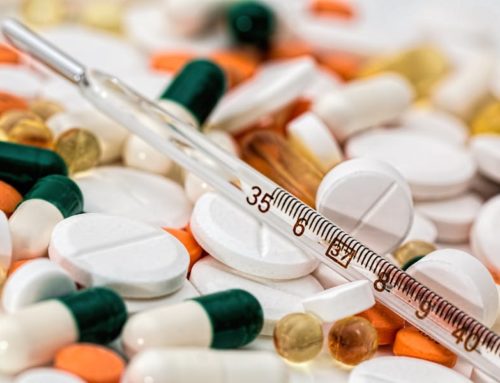Nearly 70 million Americans are afflicted with digestive issues, making digestive health a significant concern. Proper digestion is key to optimal nutrient uptake from the food people eat. Healthy digestion is also a necessity for maximizing energy levels and maintaining a properly functioning immune system. Aging, certain medications, digestive disorders, and stress can interfere with the body’s enzyme production, making digestion more challenging. Enzymes are beneficial for boosting nutrient utilization and for a smoothly running digestive tract. (1)
What Do Digestive Enzymes Do?
The mouth, pancreas, small intestine, and stomach create digestive enzymes, which speed up chemical reactions and break food into nutrients the body can absorb. Digestive enzymes help turn macronutrients (carbs, proteins, and fats) into easily absorbed particles (amino acids, cholesterol, fatty acids, nucleic acids, and simple sugars). The body uses these particles for energy and to support normal digestion. (2)
Enzymes also help with:
- Breathing
- Building muscle
- Nerve function
- Removal of toxins
Types of Enzymes
Enzymes are involved in almost every metabolic function, and there are over 10,000 identified enzymes that fall into three main types: digestive, metabolic, and proteolytic.
- Digestive enzymes work by breaking chemical bonds within proteins, carbohydrates, and fats to allow the body to use the nutrients they contain. Digestive enzymes can help boost nutrient utilization and are critical to keeping the digestive tract running smoothly. (3)
- Metabolic enzymes work inside cells to regulate metabolic pathways in energy homeostasis, including the metabolism of amino acids, glucose, and lipids. (4)
- Proteolytic enzymes (also referred to as systemic enzymes) work throughout the body to break down fibrin in the bloodstream, neutralize allergens, reduce blood clots, remove toxins, and support immune health. (5)
How Enzymes Work in the Digestive System
There are three main types of digestive enzymes, based on the reactions they help catalyze: (6)
- Amylase breaks down starches and carbohydrates into sugars.
- Lipase breaks down lipids, which are fats and oils, into glycerol and fatty acids.
- Protease breaks down proteins into amino acids.
Here is how these three digestive enzymes work in the body:
- Amylase is produced in the salivary glands, pancreas, and small intestine. One type of amylase, called ptyalin, is made in the salivary glands and starts to act on starches while food is still in the mouth. It remains active even after swallowing.
- Pancreatic amylase is made in the pancreas and delivered to the small intestine. Here, it breaks starch molecules into sugars, which are digested into glucose by other enzymes. It is then absorbed into the blood through the wall of the small intestine.
- Lipase is produced in the pancreas and small intestine. Lipase is also found in breast milk to help a baby digest fat molecules more easily when nursing.
- Protease is produced in the stomach, pancreas, and small intestine. In the stomach, pepsin is the main digestive enzyme attacking proteins. Several other pancreatic enzymes go to work when protein molecules reach the small intestine.
Benefits of Digestive Enzyme Supplements
- Enhances nutrient absorption — Essential nutrients delivered through proper digestion maintain healthy cells. If the body’s enzyme production or digestive system is compromised, its cells don’t get what they need to function optimally. Digestive enzymes speed up chemical reactions that turn nutrients into substances that the digestive tract can absorb, improving digestion. (7)
- Maximizes energy levels — Digestive enzymes are central to breaking down carbohydrates, fats, and proteins for energy. Without proper digestion function, the body cannot fully utilize food for energy. Fatigue and poor functioning digestion often go hand-in-hand. (8)
- Pairs well with probiotics — Many people support their gut health with probiotics, which can be beneficial for maintaining healthy gut microflora. Taking digestive enzymes with probiotics offers the immune-boosting and microbiome benefits of probiotics, plus the enzymes needed to break down food, absorb nutrients for energy, and reduce digestive issues. (9)
- Promotes immune function — Since 70% of the immune system is housed in the gut, enzymes are an additional element to maintain gut health. An enzyme-deficient body may even “steal” enzymes from the immune system, weakening its function. Supplementing with digestive enzymes can help mitigate this possibility by introducing more enzymes for the body to utilize. (10, 11)
- Supports digestion — Overall, digestive enzymes can boost the body’s digestion. As already mentioned, enzymes break down the foods we consume. Supplementing with enzymes can especially help those with digestive disorders or who struggle to digest certain food types.
What Interferes with Enzyme Production?
Not everyone can make digestive enzymes effectively due to illness and other complications. Some different areas that interfere with the body’s natural enzymes include:
- Aging — With age, many bodily functions slow down, including the digestive tract; it just might not work as efficiently or as quickly as in younger years. The muscles in the digestive tract become less efficient, stiffer, and weaker. The aging body undergoes a significant decline in natural enzyme production, sparking a need for support through supplementation. (12)
- Chemicals — Chemicals in the environment, as well as in products we consume, can directly affect enzymes and gut health. For example, the herbicide glyphosate can inhibit enzymes in the body and in good bacteria in the gut. Specifically, the enzyme 5-enolpyruvylshikimate 3-phosphate (EPSP) synthase. (13, 14)
- Compromised food quality — GMOs, processed foods, trans fats, and other foods of substandard quality put a strain on the digestive system. All the good nutrition in the world will not benefit an individual who cannot digest it properly. Foods without adequate nutrition can compromise digestion and not supply the body with the vitamins and minerals it needs for healthy digestion. (15)
- Digestive-blocking foods — Some foods, including beans, egg whites, nuts, peanuts, potatoes, and wheat germ, contain enzyme inhibitors that block nutrients from being properly absorbed. This can adversely affect the nutritional value of these foods and, in turn, may require enzyme supplementation to compensate. (16, 17)
- Poor digestion — Digestive issues — such as acid reflux, inflammatory bowel disease, irritable bowel syndrome, and poor nutrient absorption — can prevent enzymes in the body from functioning properly. Enzymes are crucial to healing and rebuilding the digestive tract. Because of this, individuals with digestive conditions may benefit from digestive enzyme supplementation. (18)
- Stress — Naturally, everyone experiences stress, but acute or chronic stress can affect gut health and compromise digestive function. This results in decreased nutrient absorption, poor sleep quality, and increased fatigue. Acute mental stress has different effects on the stomach, the pancreas, and upper gastrointestinal motility — all of which digestive enzymes can help regulate and restore. (19)
Can Digestive Enzyme Supplements Interfere with Other Medications?
Digestive enzyme supplements may be labeled as natural ingredients and assumed safe, but they can still interfere with other medications, such as blood thinners and diabetes medications. If you are thinking about trying a digestive enzyme supplement and is on other medications, it’s best to discuss possible interactions. (20)
Are There Side Effects to Taking Digestive Enzymes?
Sometimes there are, but it’s not common. The most common side effect of digestive enzyme supplementation is constipation. Other less common side effects to be aware of include: (21)
- Abdominal cramping
- Diarrhea
- Nausea
Although these side effects don’t happen often and aren’t usually a cause for alarm, it’s good to be aware of them in case you happen to experience them.
CT-Zyme to the Rescue
What is CT-Zyme?
CT-Zyme is a new combination of enzymes powered by Carbon Technology that provides next-level digestive support. Many people don’t naturally produce sufficient digestive enzymes to digest the foods they consume fully. Research shows that supplementing with enzymes may be beneficial for a broad range of digestive problems.
What does CT-Zyme do?
- Boost Energy – Specially selected ingredients work to enhance energy levels during your health journey.
- Digestive Support – Helps stimulate digestion and optimizes the breakdown of food in the GI tract, enabling maximum nutrient utilization and keeping the digestive tract running smoothly.
- Immune Support – Supplemental enzymes ensure that an enzyme-deficient body doesn’t “steal” enzymes from the immune system, weakening its function.
The Takeaway
Enzymes are crucial for good health. The body produces them, and you can also get them in fruits, vegetables, and supplements. Digestive enzyme supplements can help restore proper digestive function, so you can properly break down and absorb nutrients, bringing their bodies and digestion back into balance. (22)







